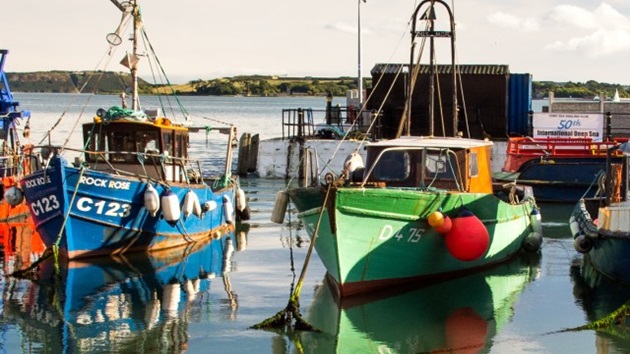This World Oceans Day, the Marine Stewardship Council (MSC) celebrates how certified fisheries are tackling overfishing and supporting ocean biodiversity by making improvements required by the MSC standards
WASHINGTON, DC - The Marine Stewardship Council (MSC), the nonprofit on a mission to end overfishing, today announced that 100 improvements were made by MSC certified fisheries in 2020, directly addressing issues related to endangered, threatened, and protected species, among others. Fisheries in the MSC program make a long-term commitment to sustainability, and improvements are a central part of achieving and maintaining certification.
Among the improvements were those made by the US North Pacific halibut fishery, which worked with federal fishery managers on innovative methods, like the implementation of heat maps, to document fishing efforts and catch composition on bycatch and discards from a specific segment of the halibut fishery (those under 40 feet in length). The fishery was successful in producing data that demonstrated limited risk in bycatch, and data continues to be collected to detect any increase in risk to main bycatch species. Collecting more information from the smaller vessels in this halibut fishery helps to ensure any risk to bycatch species is accounted for.
In other parts of the world, notable improvements include those made by an
Australian Tuna fishery which has introduced mitigation tools and electronic monitoring on all vessels to minimize harm to protected species, and a
Canadian Haddock Fishery that implemented new measures to aid the recovery of thorny skate, which is classified as vulnerable.
Fifteen of the global improvements helped enhance fisheries’ understanding and management of impacts on local ecosystems and habitats. These included an
Icelandic shrimp fishery that supported research into seabed mapping in efforts to avoid causing harm to delicate deep-sea sponge clusters. Twenty improvements were also made to fishery management and 11 to the status of target fish stocks.
This progress comes at a time when there is increasing concern about the unprecedented pressures faced by our ocean. As highlighted by a
recent UN Assessment report, there are many areas in which urgent action is needed to avoid losing marine biodiversity, – with tackling overfishing being a central recommendation to address these losses.
“Unsustainable fishing practices are a serious threat to the biodiversity and productivity of our oceans. Yet we know that with proper management, depleted stocks and damaged ecosystems can recover,” said Dr. Rohan Currey, chief science and standards officer at the MSC.
“More than 400 MSC-certified fisheries around the world are already leading the way in best practice. Often working closely with local agencies and science bodies, they also help drive research and innovation, adding to the body of knowledge in fisheries science.
“As we enter this crucial UN Decade of Ocean Science, it’s vital that we accelerate collaboration and progress across the globe if sustainable ocean outcomes are to be achieved long-term.”
To be certified as sustainable, fisheries must reach the rigorous requirements set by the MSC. But many fisheries are also given conditions of certification, which means they must make improvements to some of their practices within a specified time frame. In this way, fisheries engaged in the MSC program are incentivized to improve their performance toward global best practice.
Since the first fisheries entered assessment for MSC certification in 1999, almost 2,000 improvements have been made by fisheries to remain certified.[1] The positive contribution that these fisheries make to the protection of the ocean was recognized by two UN bodies in 2020[2], showing that MSC-certified fisheries are at the forefront of tackling overfishing and supporting ocean biodiversity.
On World Oceans Day, and throughout June National Oceans Month in the US, the MSC is reminding consumers that their purchasing decisions can positively impact what’s happening on the water. Ocean health and climate change are in the top three environmental concerns of the American public, and younger generations, those aged 18-34, are particularly motivated to take action to help protect seafood for the future. They are also significantly more ecolabel aware and willing to pay more for certified sustainable seafood.[3] Through its ‘Little Blue Label, Big Blue Future’ consumer engagement campaign, the MSC reminds conscious consumers that by making the simple choice to purchase seafood with the MSC blue fish label, they can be part of the solution and contribute to ocean health.
“The next five years for our ocean depends on the purchasing decisions consumers make today,” shared Jackie Marks, Senior Public Relations Manager at the MSC. “The future of our one shared ocean is in the hands of everyday consumers, and ending overfishing is dependent on the collective actions of a global community.”
_________________________________________________________________________________________
1 Throughout the lifespan of the MSC certification program (1999 – 31 March 2021), there have been a total of 1931 improvements from closed conditions made by MSC-certified fisheries.
2 In June 2020 the Food and Agriculture Organization reported that sustainable fisheries are more productive and resilient to change (page 8 State of the World’s Fisheries and Aquaculture). In September 2021 the UN Environment program reported that (pages 58-63 The Global Biodiversity Outlook 5) sustainable fishing protected ocean biodiversity.
3 MSC & GlobeScan Seafood Consumer Perceptions Study 2020


